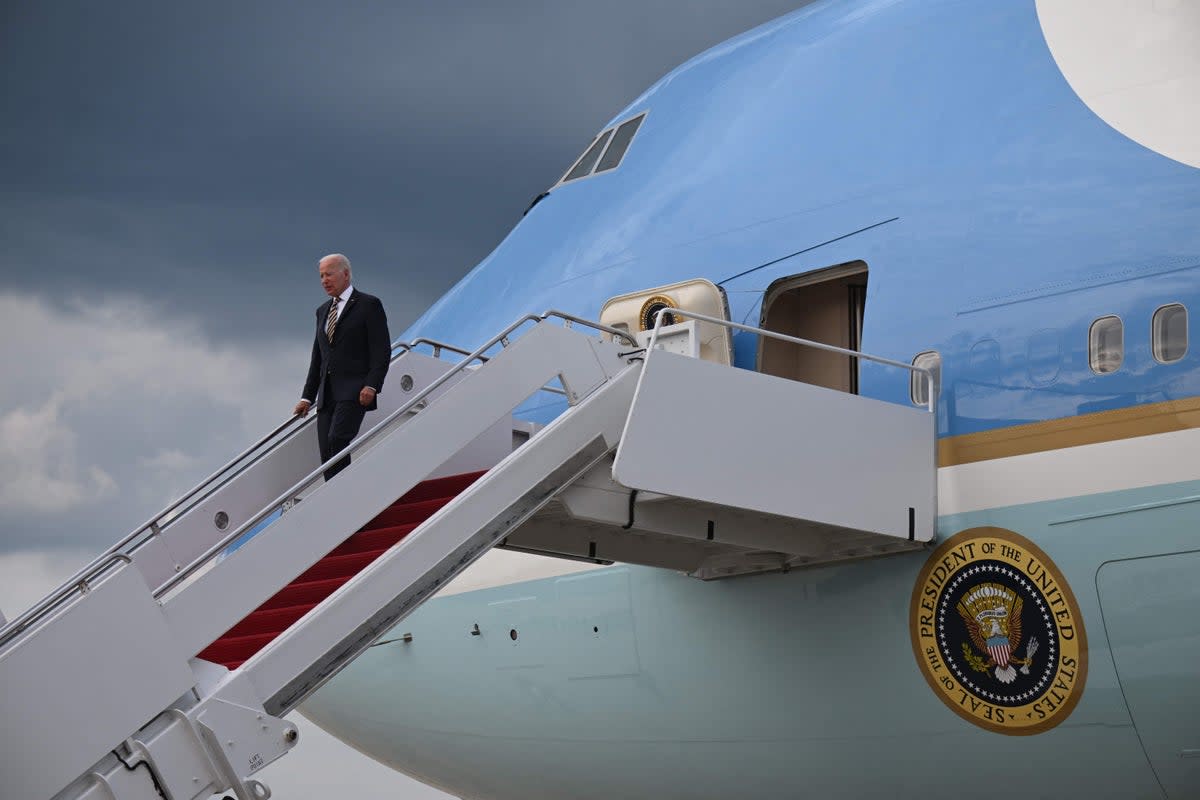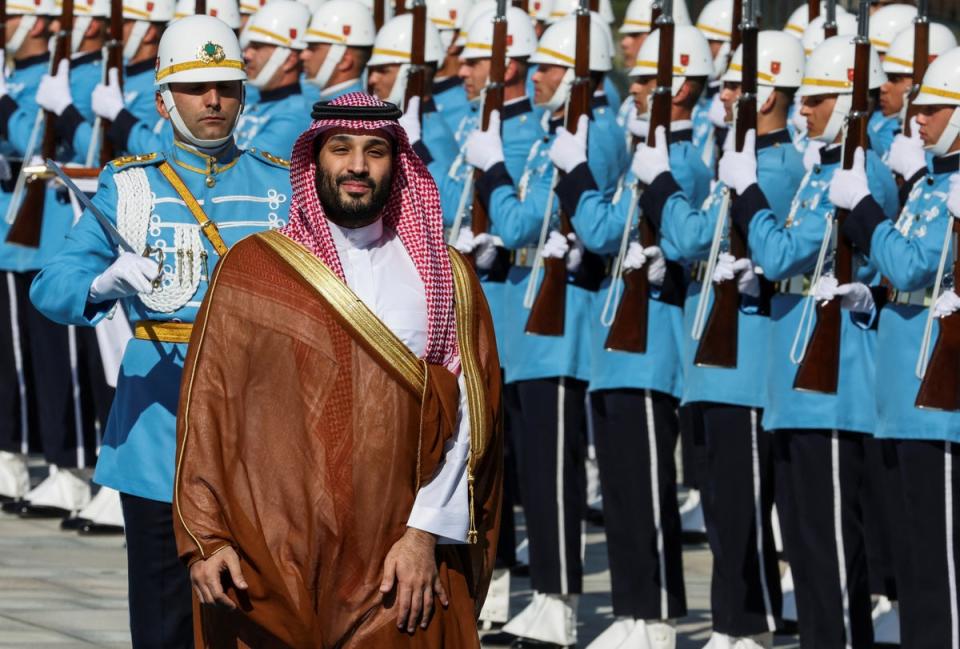‘Humiliating climbdown’ or a chance to assert US diplomacy: What’s really behind Biden’s controversial trip to Saudi Arabia

- Oops!Something went wrong.Please try again later.
- Oops!Something went wrong.Please try again later.
- Oops!Something went wrong.Please try again later.
Is anyone in Washington happy about President Joe Biden’s upcoming trip to Saudi Arabia?
In the weeks since it became known that Mr Biden would travel to Jeddah to attend a meeting of the Gulf Corporation Council and meet with Saudi leaders, the White House has been on the defensive.
In a Sunday op-ed in The Washington Post, the president said his aim has been “to reorient — but not rupture” the relationship between Washington and Riyadh after a period of heightened tensions marked by anger among Democrats regarding the kingdom’s war in Yemen (and the Trump administration’s insistence on selling the Saudis weapons to prosecute it) as well as Saudi Crown Prince Mohammed bin Salman’s role in the murder of Post columnist Jamal Kashoggi.
Under Mr Biden’s predecessor, the Saudis — and MBS in particular — largely had carte blanche to do as they wished. Trump administration officials suppressed a US intelligence community report crediting MBS with ordering Khashoggi, a prominent critic, to be strangled and dismembered by Saudi security forces in the kingdom’s Turkish consulate.
As a candidate for president, Mr Biden had vowed to reverse the kid-glove treatment Riyadh had received under Mr Trump. At one 2019 Democratic primary debate, he said he would depart from past administrations’ policies by making it “very clear” that US weapons sales to the Saudis would cease.
“We were going to in fact make them pay the price and make them in fact the pariah that they are,” he said.
Mr Biden appeared to make a yeoman’s effort to keep his promise in the early days of his presidency. While Mr Trump and his aides — most notably his son-in-law turned adviser Jared Kushner — exhibited no qualms about dealing with MBS as if he, not his father Salman, were the Kingdom’s actual head of state, Mr Biden made a point of dealing only with the king, when he dealt with him at all.
It took more than a month after he’d been sworn in to office before he even spoke with the Saudi leader, and when the two leaders did speak, a White House readout of the conversation was particularly anodyne. It noted that they addressed “the longstanding partnership between the United States and Saudi Arabia”, discussed “regional security, including the renewed diplomatic efforts led by the United Nations and the United States to end the war in Yemen, and the U.S. commitment to help Saudi Arabia defend its territory as it faces attacks from Iranian-aligned groups”.
The White House also noted that Mr Biden “affirmed the importance the United States places on universal human rights and the rule of law” and told the Saudi leader he would “work to make the bilateral relationship as strong and transparent as possible”.

But despite pressure from Democrats in Congress and various civil society experts, human rights got dropped from the agenda when the two leaders spoke again in February.
Following that 9 February call, the White House said Mr Biden “underscored the U.S. commitment to support Saudi Arabia in the defence of its people and territory” from attacks by Iranian-backed militants. The White House also said Mr Biden and the Saudi king “discussed matters pertaining to the Middle East region and Europe and agreed that their teams would remain closely coordinated over the coming weeks and months” and “further reiterated the United States’ and Saudi Arabia’s commitment to ensuring the stability of global energy supplies”.
It's that last matter — “the stability of global energy supplies” — that appears to be a major driver behind Mr Biden’s about-face on the would-be pariah kingdom.
On Monday, White House National Security Adviser Jake Sullivan said the Biden administration believes “there is a capacity” for Saudi Arabia and the other Opec nations to boost oil production enough to lower the high fuel prices that have been a major driver of inflation world-wide.
Mr Sullivan took pains to stress that the president’s trip to the region is about more than oil. He noted that the Middle East “remains full of challenges and threats,” including from “terrorist groups that still operate in a number of countries,” as well as challenges “to human rights and human freedom”.
Although most Republicans have in recent days been claiming that Mr Biden’s visit to Jeddah amounts to bending the knee to Salman for a few drops of oil — and characterising the need for the trip as a result of what they describe as policy decisions meant to harm the US fossil fuel industry — Council on Foreign Relations senior fellow Steven Cook said the need to visit the kingdom stems from the region returning to what passes for normal.
“It really is gravity,” he said, calling Mr Biden’s previous insistence that human rights concerns would dictate the relationship between Washington and Riyadh “unsustainable”.
“This really hasn't been a thing. But they've maintained the rhetoric about it. And so now, the President is really eating crow,” he said.
Mr Cook said the president could have possibly avoided the need for the trip with a simple phone call to MBS — the kingdom’s de facto ruler — in March, and suggested his visit to Israel is also ill-timed considering the “poisonous atmosphere” stemming from the recent killing of Al Jazeera reporter Shireen Abu Akleh by Israeli Defense Forces soldiers.
Timothy Kaldas, a policy fellow at the Tahir Institute for Middle East Policy, also poured cold water on the GOP claim that Mr Biden’s visit to Saudi Arabia amounts to begging for help to lower gas prices.
“I think that the reality is that there's a limit to the extent to which increased production is going to address the price problem that the US and the globe is dealing with. There are other bottlenecks contributing to that. And, frankly, they've been trying to downplay the oil issue for a while now, because I think they realize that there's a good chance this trip isn't going to deliver a significant amount of relief in terms of oil prices,” he said.
Mr Kaldas told The Independent he believes there are “a lot of people” in the Biden administration “who see the relationship with Saudi Arabia as important and would like to improve it” but cautioned that the push to improve the relationship could cost Mr Biden credibility on the matter of American leadership.
“What I think is most disappointing in this trip is that they're giving up all these pledges for centering values in exchange for nothing really substantive or clear,” said Mr Kaldas, who said the meetings with Saudi leadership could have been hosted by “a more neutral party” such as Oman or Jordan.
“The decision to do it in Saudi Arabia is really kind of a humiliating climbdown for the president after his pledge to hold MBS accountable and his failure to do so. And I don't really see anyone reading it any other way,” he said. “I think the whole world will look at it that way.”
Mr Kaldas said a bright spot in Mr Biden’s Middle East swing could be any announcement of normalisation between Riyadh and Jerusalem, but said such a step is unlikely to happen so long as Salman remains alive.
While Mr Biden’s trip attracted criticism from most corners, former Deputy Assistant Secretary of State for Legislative Affairs Joel Rubin, who managed the State Department’s relations with Congress during the last two years of the Obama administration, posited there is a method to what so many are describing as madness in sending Mr Biden to Saudi Arabia.
“It's not a good thing, but it's not a horrible thing, either,” he said. “We've got a global crisis on energy, the Iran nuclear program is a major crisis, Israeli political turmoil is a major crisis,, the Palestinians are looking to get out from under this nightmare they live in, and the Gulf Cooperation Council meetings happen to be in Saudi [Arabia] because that's where they are,” he said.
Mr Rubin said Mr Biden’s latest travel plans appear to fit into what has been a larger strategy of holding a “forever tour to diplomacy” with his foreign travel.
“He did Asia, then he came back and did Summit of the Americas, then went back out to the G7 and Nato,” he said. “This is re-establishing American diplomatic power, so I think it’s crucial to get to the Middle East even there will not be a lot of shiny objects.”
The former Obama administration official suggested that the press is “obsessed” with comparing Mr Biden’s upcoming trip to his predecessor’s inaugural trip abroad to Riyadh in 2017.
“There’s not going to be an orb this time, but that doesn’t mean it’s a waste of time, either,” he said.

